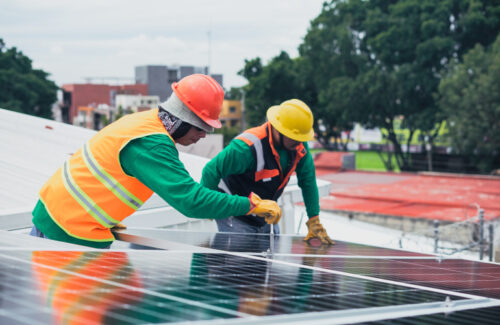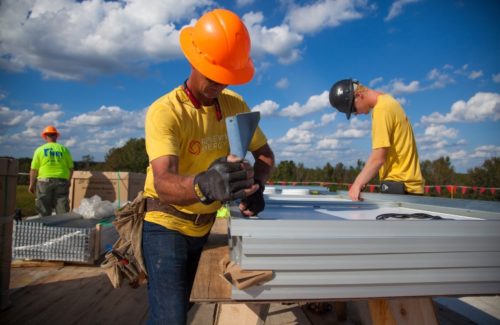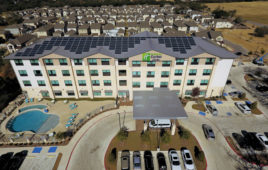By Richard Lawrence, program director, Interstate Renewable Energy Council (IREC)
Registered apprenticeship programs (RAPs) are a proven workforce development tool that is employer-driven and worker-centric. They provide a pathway for new employees to earn an entry-level salary while learning the trade through a combination of on-the-job training and related classroom instruction, with progressive wage increases as they learn and gain experience.
Apprenticeships can also help grow the solar workforce at a time when demand for workers is high and our industry will need to grow significantly to meet clean energy and climate targets. There are many additional benefits of registered apprenticeship programs, including access to tax credits, tuition and wage reimbursement, GI Bill housing allowances and other financial incentives.
Unfortunately, solar apprenticeship programs have historically been limited because key solar jobs are not yet recognized as “apprenticeable” by the U.S. Department of Labor. A recent milestone in Florida underscores the value of solar apprenticeships and complements an existing effort among industry stakeholders to develop standards that would enable this option across the country.
Florida creates a solar installer registered apprenticeship program
The Florida Solar Energy Center (FSEC) and Florida Solar Energy Industries Association (FlaSEIA) worked together on obtaining approval for a new registered apprenticeship program for solar installers. Through the hard work of FSEC and a dedicated group of solar contractors, solar companies across the Sunshine State can now take advantage of the registered apprenticeship system to grow their solar installation workforce.
 While a few other apprenticeship programs to train solar installers have been registered with state apprenticeship agencies and/or the U.S. Department of Labor (DOL), the new Florida Solar Energy Apprenticeship Program is the first one recognized as preparing individuals in the federally defined occupations of “solar photovoltaic installer” and “solar thermal installers and technicians,” both of which are not yet recognized as “apprenticeable” by the DOL.
While a few other apprenticeship programs to train solar installers have been registered with state apprenticeship agencies and/or the U.S. Department of Labor (DOL), the new Florida Solar Energy Apprenticeship Program is the first one recognized as preparing individuals in the federally defined occupations of “solar photovoltaic installer” and “solar thermal installers and technicians,” both of which are not yet recognized as “apprenticeable” by the DOL.
Florida is one of 29 U.S. states and territories that operate a state apprenticeship agency. Having a state apprenticeship agency allows Florida to approve its own occupations independent of the DOL. Florida also has a solar contractor license that allows a company to install both PV and solar thermal systems, and the new Florida Solar Energy Apprenticeship Program provides a pathway to that state-level certification.
All other programs to date have had to adapt occupations already approved as apprenticeable that share some related tasks with the job of a solar installer to get approval. These include the Oregon Limited Renewable Energy Technician program registered under the “wind turbine service technician” occupation; the Adaptive Construction Solutions Energy Utilities Installer program based on the “weatherization installer and technician” occupation; and the Power for America/Utility Workers Union of America’s Renewable Energy Specialist program that is based on the “energy auditor” occupation. Some solar companies, like ReVision Energy, have implemented electrician apprenticeship programs using the “residential wireman” and “inside wireman” occupations.
Why haven’t solar apprenticeships taken off?
From accordion maker to x-ray equipment tester, there are over 1,000 occupations approved for apprenticeships by DOL. To be recognized as apprenticeable, an occupation must meet several federal requirements:
1) “Involve skills that are customarily learned in a practical way through a structured, systematic program of on-the-job supervised learning;
2) Be clearly identified and commonly recognized throughout an industry;
3) Involve the progressive attainment of manual, mechanical or technical skills and knowledge which, in accordance with the industry standard for the occupation, would require the completion of at least 2,000 hours of on-the-job learning to attain; and
4) Require related instruction to supplement the on-the-job learning (with a recommended minimum of 144 hours of training per year).”
In order to register a RAP and begin accessing the benefits of registration, the occupation that the apprentice is hired for must first be recognized as apprenticeable by the DOL. While such federal recognition for solar installer roles has not yet been granted, there is a pathway to obtaining it and enabling the creation of RAPs for these roles.
Solar employers recognize the value of apprenticeships
The Interstate Renewable Energy Council (IREC) and Solar Energy Industries Association (SEIA) have been working to develop new apprenticeship options for the solar industry through the U.S. Department of Energy funded Solar Ready Veterans Network. Dozens of companies from across the spectrum of installation scope and scale have already joined our effort. RAPs are one of the best ways to connect veterans with new career opportunities because veterans can access GI Bill housing allowances worth upward of several thousand dollars a month while participating in a registered apprenticeship.
In late 2021, IREC and SEIA held an apprenticeship information session for solar employers, a recording of which can be viewed here. During this session, after reviewing the DOL apprenticeablity requirements, 96% of the more than 100 industry participants believed that the solar installer occupation meets the requirements to be apprenticeable. And after learning more about how apprenticeships work and the benefits they can provide to workers and employers, 90% thought their company could benefit from having an apprenticeship program for their solar installers.
Apprenticeships benefit employers and workers
Apprenticeships offer substantial benefits for employers and workers. Through the structured training components both on the job and in the classroom, employers can ensure that workers obtain the knowledge and skills needed to perform the job in an efficient, safe, and professional manner. The commitment to training and wage progression results in higher retention and job satisfaction, as well as higher quality work with fewer defects and accidents. The Construction Industry Institute has found that each dollar invested in craft training returns between $1.30 to $3.00 in benefits in the form of increased productivity and reductions in turnover, absenteeism, rework and other areas.
With requirements for equal opportunity, non-discrimination and setting of diversity goals, RAPs can also be useful ways to attract diverse talent. Significant financial incentives, such as tax credits, wage reimbursements and funding for training supplies, stipends and other wrap-around services, are also available through various federal, state and local workforce investment programs.
New solar apprenticeships could benefit both union and non-union companies
Registered apprenticeship programs are a valuable tool for building a skilled and diverse workforce. IREC believes that both unions and independent contractor associations could bring more clean energy companies into their memberships, attract new workers to their rosters and improve prospects for organizing workers within the industry if they offered apprenticeships in newer, rapidly growing occupations like solar installers in addition to the traditional occupations like electrician, roofer, carpenter and construction laborer.
The IBEW Local 606 of Central Florida was an active participant in the committee that created the new Florida Solar Installer Apprenticeship program. The union, drawing from its extensive experiences with RAPs over the years, provided valuable insights into the process to help ensure program success.
Get involved to unlock the benefits of apprenticeships for the solar industry
Hundreds of thousands of new jobs will need to be filled in the coming years to meet clean energy and carbon reduction goals, and apprenticeships are one of the best ways for employers to attract and train individuals in a variety of occupations.
Interested stakeholders are invited to join IREC and SEIA in the development and registration of National Standards of Apprenticeship that will allow solar employers, unions, educational institutions, training providers and workforce development organizations across the country to utilize RAPs to train solar workers and access the benefits that registered apprenticeships offer.
IREC welcomes those from any company, union, independent contractor or other organization involved in solar installations to join us in designing new standards of apprenticeships for solar occupations. To get involved, complete the interest form here.






It’s great to see that FSEC has gotten this program off the ground!
IronRidge would be interested in freely sharing our Installer Certification Training Assets with PV Installer apprenticeship programs. It is currently being utilized by many Solar Schools nationwide, as well as the United Brotherhood of Carpenters in their apprenticeship program.